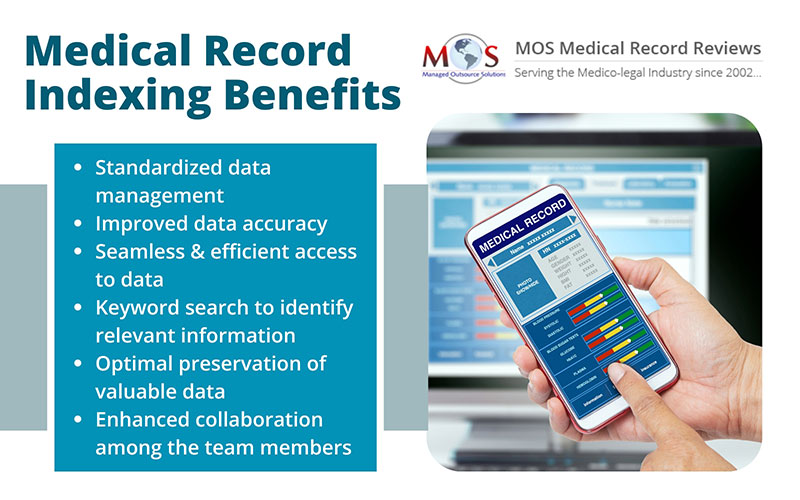Medical record indexing or medical record organization involves classifying and organizing the medical records relevant to a particular case or claim. This classification is made based on criteria such as patient diagnosis, treatment, identification and so on. Indexing facilitates access to patient data which is vital to ensure better patient care, improved data management and efficiency in functioning. Properly indexed medical records help with easy retrieval and quick identification of specific information you are looking for, whether for medical, legal or research purposes. Attorneys find the indexing and summarizing process very useful since it presents them with all the required medical data in an easily accessible and usable format.
MOS Medical Record Reviews provides value-added medical record review and indexing services.
The Medical Record Organization and Indexing Process
Typically, medical records include patient history, physician notes, RN records, imaging records, treatment plans, lab notes, progress notes, call records, peer-to-peer reviews, therapy notes, and after care visit notes among others. During the indexing process, unique identifiers are assigned to these categories of medical records. A comprehensive database comprising keywords, metadata and other identifying elements is created to help with easy search and medical data retrieval.
The medical record reviewer abstracts all important information from the records and arranges them in chronological order. When summarizing the records, consistency and accuracy are of prime importance. It is important to ensure that no key data is left out. Pagination is an important part of indexing. When assigning page numbers to the records, there are certain legal requirements to be followed. The numbering starts from “Page 1” and increases steadily throughout the entire medical record. These numbers will be referenced in the Indexing and Summarization sections. The medical record index created is very useful for busy attorneys. Without this index, attorneys will find it challenging to locate a specific medical document amidst the pile of records. A well-prepared index helps attorneys speed up their cases and go on to win cases/claims for their clients in a timely manner.
Typically, hyperlinks are embedded in the indexed medical records. This enables attorneys to easily find the source medical records for specific data or information. Attorneys benefit from considerable cost savings and valuable insights into the case and its components.
Medical Record Indexing Helps with Early Processing of Data
When organized medical records are available at an early stage itself, attorneys can quickly identify potential issues while also avoiding concerns such as missed evidence or delays. As a result, there is improved efficiency and accuracy and reduced costs. When the records and the facts are accurate, there is no question of surprises and challenges emerging later on in the case. Cost savings come in the form of fewer unexpected expenses such as rush fees, postponed court dates, and overtime pay among others.
Outsource Medical Record Indexing for the Best Results
Attorneys often prefer to outsource this process to a medical claims review company to save valuable time and remain cost-effective. Today, such third-party providers use AI (artificial intelligence) as well as human support to review the medical records and index them efficiently. Any paper records are scanned first into electronic format, separated and classified. The indexed records are checked for accuracy and errors if any, and tracked for correction and appropriate action.
There are many advantages that come with outsourcing the process. Reliable outsourcing companies ensure HIPAA compliance and data security with proper encryption protocols and other safety measures. The review and indexing are performed by dedicated medical record review professionals who stay updated on all industry trends and other related aspects. They make sure that the indexing is done with expertise and detailed summaries are prepared and made available for attorneys to quickly utilize and strengthen their cases. They deliver the indexed records within the required turnaround time, ensuring quality and accuracy. Importantly, these services are often more cost-effective than having the indexing done in-house.
Best Practices for Indexing Medical Records
Effective indexing practices are vital to ensure accurate, accessible and compatible data for the case or claim. Here are some best practices to consider.
- Have systems and tools in place to identify, request and retrieve the medical records
- Utilize advanced technologies such as artificial intelligence or machine learning
- Co-ordinate with the attorneys on the other side, medical experts and providers for timely retrieval and processing of records
Medical record indexing has a vital role to play in efficient data management for legal-medical cases. It helps streamline data retrieval, improve working efficiency and enhance case/claim outcome.
Contact MOS for state-of-the-art medical review solutions.
Let us help you organize and streamline the medical records for your case.





